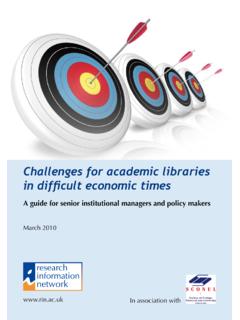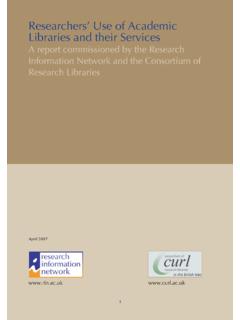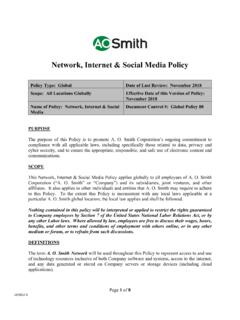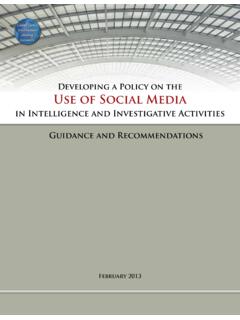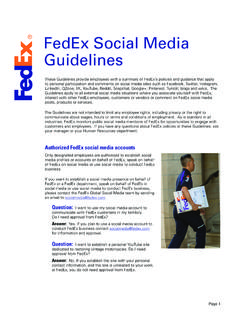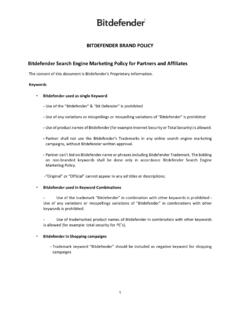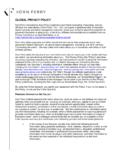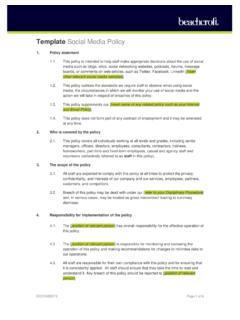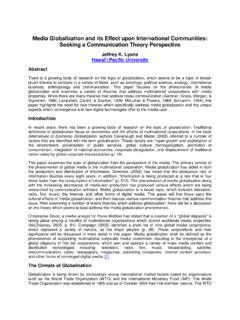Transcription of Social Media - Home | Research Information Network
1 February 2011 Social Media :A guide for researchersThis guide has been produced by Alan Cann of the Department of Biology at the University of Leicester, and Konstantia Dimitriou and Tristram Hooley of the International Centre for Guidance Studies, and published by the Research Information Network , to provide researchers with an understanding of Social Media , and its possible uses within the Research International Centre for Guidance Studies, University of Leicester and the RIN wish to thank the peer reviewers involved with this publication; Christina Mendes-Da-Costa, Neil Witt and Martin Media : A guide for researchersLinks to all services mentioned in this guide are available on the RIN website at Introduction: Why pick up this guide? Page 52. What are Social Media ? Page 7 What Social tools are available? Page 7 Consuming Social Media Page 9 Producing Social Media Page 10 Criticisms of Social Media Page 11 Answering the criticisms Page 123.
2 What do Social Media mean for researchers? Page 15 Identification of knowledge Page 17 Creation of knowledge Page 18 Quality assurance of knowledge Page 19 Dissemination of knowledge Page 214. Social Media tools for researchers Page 23 Social and professional networking tools Page 23 Social bookmarking Page 25 Tools for Social -citation sharing Page 26 Blogging Page 27 Microblogging Page 28 Research and writing collaboration tools Page 29 Project management, meeting and collaboration tools Page 315. Managing Information overload Page 35 Approaches to reading Page 35 Tools for filtering Page 36 Creating the right Network Page 376. Final thoughts Page 407. Further reading Page 418.
3 References Page 42 Web materials 1: Links and Resources Page 43 Web materials 2: Researcher case studies Page 439. Glossary of key terms Page 441 Social Media : A guide for researchersThis guide will show you how you can use Social Media to help your Research and your career. Social Media have big implications for how researchers (and people in general) communicate and collaborate. Researchers have much to gain from engaging with Social Media in various aspects of their work. This guide will provide you with Information to make an informed decision about using Social Media and enable you to select wisely from the vast range of tools that are available. Given the buzz in the Media , you may feel that Social Media are aimed at teenagers and mainly used to discuss celebrity culture. But this guide will show you how Social Media offer researchers an opportunity to improve the way they work. One of the most important things that researchers do is to find, use and disseminate Information , and Social Media offer a range of tools which can facilitate these activities.
4 The guide discusses the use of Social Media for Research and academic purposes, rather than the many other uses that they are put to across society. This guide will show how Social Media can change the ways in which you undertake Research , and open up new forms of communication and dissemination. The researchers we interviewed in the development of this guide are using Social Media to bridge disciplinary boundaries, to engage in knowledge exchange with industry and policy makers, and to provide a channel for the public communication of their Research . 1. Introduction: Why pick up this guide?5 The guide is rooted in the practical experience of its authors and of the ten Social Media users we interviewed as part of the project. We are not trying to present Social Media as the answer to every problem a researcher might experience; rather, we want to give a warts and all picture. Social Media have downsides as well as upsides, but on balance we hope that you will agree with us that there is real value for Media : A guide for researchers2.
5 What are Social Media ?This guide uses the term Social Media to refer to Internet services where the online content is generated by the users of the service. Although there are other, largely synonymous terms for such services (Web , participatory Media , etc), for consistency this guide will use the terms Social Media (to describe the phenomenon) or Social tools (to describe the technologies). Social Media rely on Web-based technologies to turn discrete, usually rather short, user contributions such as status updates or comments into an activity stream. Examining Social Media therefore requires us to think about how Social tools facilitate the production and dissemination of Information , and how they enable people to discuss and consume this Information . We focus in this guide on how Social Media can be used by researchers. We examine a range of different tools and discuss how they might be employed. Throughout the guide we have also included quotations from interviews with ten researchers who are already using Social Media in their Research .
6 However, before we begin to look in detail at how you can use Social Media for Research , it is important to gain an overview of what is meant by the term. What Social tools are available?Even if you are not familiar with the term Social Media it is likely that you have heard of, or even used, many of the Social tools themselves. They can be divided into a number of categories and we describe examples of many of them in this guide. To begin with, some commonly-used tools are mentioned below. There is a full glossary at the back of this guide, which you can use if these terms are unfamiliar. 1. Adapted from Blogging:Blogger, LiveJournal, TypePad, WordPressMicroblogging:Twitter, Yammer, Google BuzzLocation:Foursquare, Gowalla, Facebook PlacesSocial networking:Facebook, LinkedIn, MySpaceAggregators:Google Reader, Netvibes, Pageflakes, iGoogleConferencing:Adobe Connect, GoToMeeting, SkypeWikis:PBworks, Wetpaint, WikiaSocial bookmarking:Delicious, Diigo, BibSonomySocial bibliography:CiteULike, MendeleySocial news:Digg, Reddit, NewsvineSocial documents:Google Docs, Dropbox, ZohoProject management:Bamboo, Basecamp, HuddlePhotographs:Flickr, Picasa, SmugMugVideo:Viddler, Vimeo, YouTubeLive , Livestream, UstreamPresentation sharing:Scribd, SlideShare, SliderocketVirtual worlds:OpenSim, Second Life, World of WarcraftCommunication:Collaboration:Mult imedia:18I prefer to discover Information for my job by using Social Media like Twitter and to a lesser extent Facebook and in face-to-face talks with people from the University of Leicester.
7 For Research it tends to be through skimming the journals and talking with people through email. Ancient History/Archaeology is still strong on email lists and isn t yet happy about the ideas of weblogs. Alun Salt (Archaeoastromomist) I access Information mainly by using Social Media . I use Twitter and I read a lot of blogs. I like to keep up to date directly with the people involved in the Research . I use blogging, microblogging, online writing tools, Social /professional networking tools and iGoogle quite extensively. The first thing I started using was Facebook in Davenport ( Research Assistant, Hemato-oncology) I prefer to use blogging, microblogging like Twitter, Social bookmarking, Social citation like Zotero, writing tools, Social /professional networking tools like Facebook and LinkedIn and aggregators and dashboards like Netvibes. I think all of them are integral in my everyday and professional life but for different Golovuskina (PhD student, Education) 9 Social Media : A guide for researchersConsuming Social mediaThe Social tools mentioned above all provide channels through which new Information is being produced every day.
8 For some people this can be overwhelming and lead to a feeling of Information overload. However, people typically use Social Media in a way which uses their Social or professional networks to filter the vast array of Information down to something that is manageable. Once you have built a Network of people with interests similar to yours, you can use them to identify resources that you are likely to be interested in. Unlike traditional search technologies, which only return results related to the search terms that you input, Social tools harness your Network to inform you about issues and developments you may not be aware of. They can even provide alternative strategies and approaches to questions based on collective experience. In other words, search can provide you with answers only to the questions you ask, whereas Social Media can also provide you with intelligently-filtered Information that helps to stimulate new questions, in the same way that a conversation with a colleague might.
9 Building up a Network that can provide you with this kind of Information takes time. The process of building, curating and filtering useful networks is a skill which needs to be practised. Most tools offer you ways to find people who might share your interests however, and once you have started building a Network it becomes useful very think Social Media made me a better researcher because I find stuff out a lot quicker. I now have a Network of individuals I respect and am confident in their work. The Network discovers and filters and discusses. I have connected my Research to the real world in a way that would not have been so easy before and maybe not possible. For curriculum development and teaching this has connected with real issues that interest and engage students and has helped them become student researchers in their own right with a broader and more critical take on Wassall (Principal Teaching Fellow, Sociology) 10I first started using Social Media because it was clear to me that as researchers we needed to publish more effectively to support better development of theory around what were very empirical areas.
10 So it was initially about effective data sharing. Then I got interested in the more general ideas of effective communication on the web and found there was a community already out there. I wanted both to be able to record my own ideas in this space in a way that was native to it and to engage with that community, so blogging was a natural course to Neylon (Senior Scientist, Biophysics) Producing Social mediaGathering Information from a diverse range of people can be very useful. However, it is when you move from merely consuming to producing Social Media that you are likely to notice some of the biggest changes. The idea of being a participant in a community is very important in Social Media (and also in academic discourse). Social Media theorist Clay Shirky (2010) said: "Participants are different. To participate is to act as if your presence matters, as if, when you see something or hear something, your response is part of the event."Participating in Social Media does not necessarily mean that you have to be a major producer of content.
